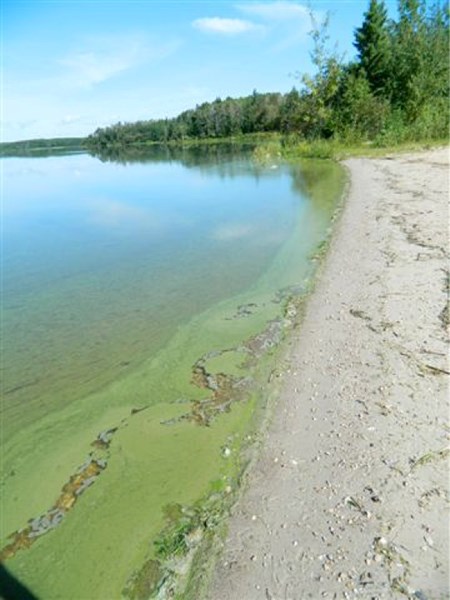ST. PAUL - Blue-green algae has been identified in the waters of a popular lake between St. Paul and Elk Point.
On Aug. 13, Alberta Health Services (AHS) released a health advisory for Stoney Lake, which is located in the County of St. Paul.
Residents living near the shores of Stoney Lake, as well as visitors to this lake, are advised to avoid all contact with cyanobacterial blooms. If contact occurs, wash with tap water as soon as possible.
People should not swim or wade or allow pets to swim or wade in any areas where cyanobacteria is visible. AHS also recommends people not give whole fish or fish trimmings from this lake to pets.
Limiting human consumption of whole fish and fish trimmings from this lake is also advised for humans.
"As always, visitors and residents are reminded to never drink or cook with untreated water directly from any recreational body of water, including Stoney Lake, at any time. Boiling of this water will not remove the toxins produced by cyanobacteria. An alternate source of drinking water should also be provided for pets and livestock, while this advisory is active," according to AHS.
"Cyanobacteria is naturally occurring, and often becomes visible when weather conditions are calm. Appearing like scum, grass clippings, fuzz, or globs on the surface of water, cyanobacteria can be blue-green, greenish-brown, brown, and/or pinkish-red, and often smell musty or grassy," says the health advisory.
"People who come in contact with visible cyanobacteria or who ingest water containing cyanobacteria may experience skin irritation, rash, sore throat, sore red eyes, swollen lips, fever, nausea and vomiting and/or diarrhea. Symptoms usually appear within one to three hours and resolve in one to two days. Symptoms in children are often more pronounced; however, all humans are at risk of these symptoms. Exposure to the bacteria may be fatal to pets."
Weather can cause algae blooms to move from one location in the lake to another, so the advisory will remain in effect until further notice, according to AHS.
If you suspect a problem related to cyanobacteria or if you require further information on health concerns and cyanobacteria, call Health Link at 811.



